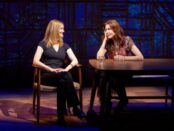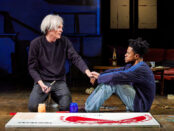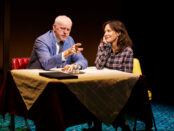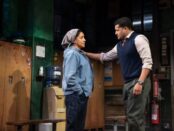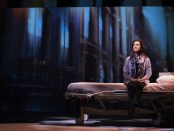Manhattan Theatre Club
Under the dynamic leadership of Artistic Director Lynne Meadow and Executive Producer Barry Grove, Manhattan Theatre Club has grown in four and a half decades from a prolific Off-Off-Broadway showcase into one of the country’s most acclaimed theatre organizations.
The play is an expression of the quiet whirlwind within Mary Jane’s soul, exquisitely expressed by the warm McAdams, surrounded by the boundless support of the others. Director Anne Kauffman masterfully allows the play to express vast emotions in the most subtle ways. What might have been a tearjerker is so much more, a chance to completely belong in this character’s mind and heart. [more]
Brooklyn Laundry
John Patrick Shanley has become our poet of lonely, desperate working class people trying to make a connection despite their inadequacies and hang-ups in such plays as "Danny and the Deep Blue Sea," "Savage in Limbo," "the dreamer examines his pillow," "The Big Funk" and "Outside Mullinger" and, of course, in his Academy Award-winning script for "Moonstruck." In all of these works, the pair makes an unlikely couple who fight against their very attachment as outside of the realm of possibility. In his latest play, the bittersweet "Brooklyn Laundry," he creates another lovely story of an unlikely couple Fran and Owen who find each other just when they need someone most. [more]
Prayer for the French Republic
Harmon meticulously fuses the domestic ups and downs of this bright, well-educated extended family with the overwhelming and unavoidable social upheavals that surround them whether it’s the Nazi persecutions or the rise in anti-Jewish violence and rhetoric in contemporary France. Their story is epic, but intimate. David Cromer, the director, isn’t afraid to keep "Prayer" flowing in a deliberate, unhurried pace, or pausing at times letting the play breathe. He makes the epic quite human scale. "Prayer for the French Republic" is monumental, yet human scaled, addressing a resurgent scourge with intelligence and warmth. [more]
Poor Yella Rednecks
Although playwright Qui Nguyen declared early in his earlier play "Vietgone" that “all characters appearing in this work are fictitious,” in his sequel "Poor Yella Rednecks" now at Manhattan Theatre, co-commissioned with South Coast Repertory, the playwright played by Jon Norman Schneider begins by interviewing his 70-year-old mother Tong Nguyen about how his parents built a life in America as Vietnamese refugees. Directed by May Adrales who also directed the earlier play in the same exuberant fashion, the resulting flashbacks are raucous, raunchy and poignant. In what was originally announced as a quintet of plays, "Poor Yella Rednecks" is now described as the middle play of a trilogy. [more]
Jaja’s African Hair Braiding
"Jaja" is quite different from Bioh's other plays in that it is also very revealing about life in NYC for African immigrants. Directed by Whitney White who has piloted several major new Black plays in recent years, the play is funny, poignant and illustrative. The excellent and compelling cast of 11 includes six fine actors making their Broadway debuts. David Zinn’s detailed hair salon puts every inch of Jada’s Harlem African Hair Braiding parlor on stage down to the last braid and bobby pin. [more]
King James
Whether you are a basketball fan or not, Rajiv Joseph’s "King James" is an intriguing depiction of an unlikely friendship over 12 years. Under Kenny Leon’s polished direction, Glenn Davis and Chris Perfetti hold the stage with their complicated relationship and representation of male friendship. Although the play doesn’t tackle new ground, it remains absorbing as time passes and the men’s careers take different paths. [more]
Summer, 1976
Auburn (Pulitzer Prize winner for Proof) has a knack for writing complex female characters. That knack hasn’t failed him in "Summer, 1976." Diane, the lustrous Laura Linney, is an aloof artist/university professor who meets Alice, the warm and magnetic Jessica Hecht, a stay-at-home mom, via their very young daughters. Alice’s husband, the unseen, but occasionally heard, Doug, an economist on the tenure track at the university where Diane also teaches, devised a babysitting co-op that involved coupons exchanged for hours of babysitting, a system that eventually breaks down quite humorously. [more]
The Best We Could (a family tragedy)
Hands down Emily Feldman’s "The Best We Could (a family tragedy)," at the Manhattan Theatre Club, wins the most ironic title of the year. Not one character does the best he or she could in this heart-twisting five-actor drama. The play details the long, slow descent of a family, cushioned only by an occasional jest and buoyed by the intensely moving acting by the ensemble with Frank Wood standing out in a superb demonstration of artistry. [more]
The Collaboration
While Bettany and Pope are each very convincing as Warhol and Basquiat since they are made up to look exactly like they did in life, they seem to be in two different plays, using different acting styles. The other problem with "The Collaboration" is that it feels very superficial, like a laundry list of items for them to discuss, while at least several of the dramatic devices are taken out of context or are relocated in chronology. It is certainly a fascinating premise: an older famous and fabulously successful artist whose star is fading and a younger rising star who has taken the art world by storm and seems to be unstoppable, brought together by their shared dealer. [more]
Kimberly Akimbo
"Kimberly Akimbo," David Lindsay-Abaire’s oddball take on the title character’s dishearteningly sad disease, began life as a play back in 2001, reaching New York via the Manhattan Theatre Club in 2003. In 2021 Lindsay-Abaire (libretto and lyrics) combined resources with the eloquent composer, Jeanine Tesori, to restyle the play as an award-winning musical produced at the Atlantic Theater Company in November 2021. This is the production that has moved to the Booth Theatre where it now resides featuring the glowing performance of Victoria Clark as the troubled title character. Jessica Stone repeats her directorial duties, managing the move to a larger venue with skill and subtlety. [more]
Where the Mountain Meets the Sea
A touching portrait of a father and his alienated son unfolds in the Manhattan Theatre Club’s "Where the Mountain Meets the Sea" by Jeff Augustin, directed by Joshua Kahan Brody. ... "When the Mountain Meets the Sea" is not only about two different people, but two different time periods. Jean exists in memory while Jonah’s journey is to cross the country, retrieve Jean’s ashes and spread them over Haiti. [more]
Cost of Living
Perhaps because of its prestigious accolade, or just undeniable merit, "Cost of Living" is the first of Majok's heartfelt efforts to make the journey from off-Broadway to on-Broadway in the Manhattan Theatre Club’s production, a transition that, thanks to director Jo Bonney's returning and unflinching guidance, hasn't diminished any of the play's intimacy or daring. If anything, on Wilson Chin's Bergman-meets-Bayonne turntable set, gloomily lit in unrelenting twilight by Jeff Croiter, "Cost of Living" has become even more persuasive and poetic. Invaluably serving that dramatic growth are actors Gregg Mozgala and Katy Sullivan, repeating their roles from the play's 2017 New York City Center premiere by MTC. [more]
Golden Shield
Although playwright Anchuli Felicia King’s plays have been performed in London, Washington, D.C., Staunton (Virginia), Melbourne, and Sydney, her Susan Smith Blackburn Prize-nominated "Golden Shield" appears to be her first New York main stage production. Ostensibly about a young, idealistic lawyer’s attempt to bring her sister on board as a translator in a risky legal battle with a multinational tech corporation, the play is about half a dozen other things as well: sibling rivalry, child abuse, ethical turpitude, human rights issues, governmental suppression of the internet, legal loopholes, and corporate greed. The play actually conflates two different very real lawsuits (against internet giants Yahoo and Cisco) which may explain why it is initially so complicated. [more]
How I Learned to Drive
A lure of this Broadway premiere revival is 25 years later experiencing the acclaimed performances of much of its original cast. Being a memory play, their current ages are irrelevant, especially when their talents are impeccable. With her renowned charismatic stage presence, Mary-Louise Parker is monumental as Lil’ Bit. Ms. Parker’s drawling vocal delivery and magnetism fully and poignantly realizes the character from the perspective of an older woman looking back on her dysfunctional adolescence. The soft-spoken and shattering David Morse soulfully embodies Uncle Peck, a delusional W.W. II veteran who has descended into alcoholism and pedophilia. [more]
Prayer for the French Republic
Joshua Harmon’s latest play, the dense, untidy, brilliant and timely Prayer for the French Republic, is his most ambitious, epical play covering five generations of one French Jewish family with relatives in America as they negotiate the troubled landscape in a time when Marine Le Pen, president of the National Front, an anti-Semitic, xenophobic and Islamophobic organization, may win the election for president of France. Marcelle and Charles have to consider if France is still safe for their family which includes 28-year-old daughter Elodie and if not where they should go. If you think none of this has anything to do with you, Marine Le Pen is currently running for President of France once again and the Manhattan Theatre Club at New York City Center Stage I has a husky guard on watch throughout the performance in Manhattan – that is the world we live in. The play also contains the most dramatic scenes to be played on a New York stage in many years. David Cromer’s production is riveting in its intensity and as a play of ideas it is very accessible even to those who have not been following recent current events. [more]
Skeleton Crew
Set in the breakroom of a stamping plant in 2008, Ms. Morisseau achieves a high level of dramatic writing with this well observed exploration of Black working-class life. Each of the short scenes is perfectly crafted, imparting exposition, plot points and narrative momentum. Morisseau also has created four vivid, appealing and humane characters who speak her authentically rich dialogue and who are majestically performed. [more]
Morning Sun
In a departure for him, the three actresses play all of the characters, both female and male, and are listed in the program simply as 1, 2 and 3. While the play feels undramatic and has no high points it does put the entire 67 years of the life of its heroine Charlotte (Charley) McBride played by Falco center stage. This low-key form seems to be the point for Stephens: life is a series of moments, like beads on a string, rather than big explosions or confrontations. With Brown playing her mother Claudette and Marin playing her daughter Tessa, both actresses also take turns narrating and playing other people in Charley’s life: her father Harold, her best friend Casey, her lover Brian, her husband Edward, her Uncle Stanley. Not only is the drama low-key, the characters play ordinary people, a saleswoman at Macy’s, a receptionist at St. Vincent, a janitor at the YMCA, the sort of people one had met or can identify with, unpretentious and unassuming: what most of the world is made up of. [more]
Lackawanna Blues
Employing his majestic vocal and physical talents, Santiago-Hudson supremely differentiates each of his brief characterizations with specificity and pathos. There’s also a poignant dynamic as he plays himself as a child and now at his current age. Santiago-Hudson’s staging is equally as assured as visually and aurally and the production is impeccable. Blues guitarist Junior Mack is onstage dramatically matching the spoken words with his skillful performing of Bill Sims Jr.’s intense original music. [more]
My Name Is Lucy Barton
Laura Linney is never one to avoid a challenge. When she last appeared at Manhattan Theatre Club’s Samuel J. Friedman Theatre she was alternating in the roles of “Regina” and “Birdie” in the revival of Lillian Hellman’s "The Little Foxes" and won a Tony Award for Best Actress for her efforts. Now she is back in an adaptation of Elizabeth Strout’s novel "My Name is Lucy Barton" where she plays both the title character and her mother and is the only performer on stage. Directed as she was in the London production by Richard Eyre, she beautifully captures the tone and voice of Strout’s heroine. [more]
Bella Bella
Like a great many history plays, Harvey Fierstein's "Bella Bella" is as much about the present as the past, paralleling everything that's gone wrong now with what went wrong then. Unsurprisingly, it's also shamelessly biased, with the first word in the play's title apparently meant to be read in Italian as part of Fierstein's banally straightforward tribute to Bella Abzug, the feistiest of feisty 1970's New York City politicians, best known for her take-no-prisoners liberalism as a member of the U.S. House of Representatives. One's enjoyment of the play probably depends on how prone you are to clap or hiss along with the rest of the unambiguously sympathetic Manhattan Theatre Club audience, even if it's only in your own head. [more]
The Height of the Storm
What is evident is that Zeller writes tremendous roles for actors. Frank Langella won the Tony Award back in 2016 for the title role of "The Father," and "The Height of the Storm" may well win others. The current production includes all but one of the British cast from Jonathan Kent’s London presentation and two-time Tony Award winner Jonathan Pryce and three-time Olivier Award winner Eileen Atkins give the kind of performances that legends are made of. As André, Pryce is like a lion in winter: confused, detached, incoherent at times, yet raging due to his loss of power, and completely bereft when his wife is not in the room. His anger is always palpable and makes him seem bigger than his actual stature. [more]
Long Lost
The play offers no catharsis as the actors are so low-key throughout, all much too calm even when the stakes are rising. As a result, there is little or no tension even when we realize the pattern that each scene will offer a worse revelation than the one before. Tergesen’s black sheep Billy gives us no clue as to the reason for his malignant behavior. Both AuCoin as his brother David and Parisse as David’s wife Molly are cool and sophisticated when they should be losing their temper. Wolff’s Brown University freshman is too inarticulate, but unfortunately he is straitjacketed by the dialogue he has been given. [more]
Ink
In the final analysis, "Ink" is too swift and too slick for its own good--or should I say, for our good? Even if you know some of the details it traffics in, they zoom by at such a rapid clip, that it’s sometimes hard to follow. Director Goold is to be faulted for the pace, no less than the playwright, Graham: it’s as if they both wanted to cram in too much information; and, despite the rave reviews this play and production continue to receive, some of it was lost on this particular reviewer. [more]
The Cake
Brunstetter overloads the issue in the play by making Jen have doubts about being in love with a woman against her parents’ religious teachings, even though she cannot imagine life without the caring, compassionate, uninhibited Macy. Additionally, when Della quotes the Bible to Macy, Macy retaliates by pointing out that as a childless woman Della has not fulfilled her religious duty as a wife. The plot then goes in another direction to show us Della and her husband Tim who has lost interest in sex since he discovered he had too low a sperm count. The play builds to Jen revealing her real childhood feelings to Macy, as well as Della demanding that after years of estrangement Tim make passionate love to her as he did at the beginning of their marriage. Ultimately, Brunstetter wants to have it both ways with an ending that does not resolve the religious question at all. [more]
Choir Boy
Now playing at the MTC’s Samuel J. Friedman Theatre on Broadway, "Choir Boy" is set at The Charles R Drew Preparatory School for Boys, a Catholic academy for young men of color. Written by Tarell Alvin McCraney (who shared the 2017 Academy Award for Best Adapted Screenplay for Moonlight), the problem with the play is that Pharus’ colleagues and choir mates prove as generic as the student uniforms they all wear: blue blazers, white shirts, striped ties, and beige trousers. (The costume designer is David Zinn, who also did the scenery.) [more]
India Pale Ale
Playwright Jaclyn Backhaus made an auspicious splash with her adventurous and inventive 2016 play Men on Boats about Major John Wesley Powell’s 1868 Colorado and Grand Canyon expedition which was played by all women as a satire of the machismo of this all-male trip. In her new play, India Pale Ale, Backhaus, who is part Punjabi, writes of something must closer to home: the Punjabi community in Raymond, Wisconsin. While the play’s authenticity is palpable in both its writing and acting, the play in its four acts seems to be pulling in four different directions. It is not so much that the play does not have much of a plot, but that is inconsistent in its theme and message. [more]
The Nap
It isn’t revealing too much to say that the play culminates with a real Snooker match between two men vying ultimately for the world championship and ostensibly being watched by 23 millions viewers all over the world. And since they’re playing in real time, Bean had to come up with alternate dialogue, depending on which of them wins. Those two men are the local Sheffield champ, Dylan (Ben Schnetzer), and his competitor Abdul, who is played by world-class Snooker champion Ahmed Aly Elsayed. (Elsayed actually won the Egyptian Snooker Championship for three consecutive years before moving to the USA and winning US National Snooker Championships for another three consecutive years.) [more]
Dan Cody’s Yacht
Both Kevin and Cara are single parents, which is only the beginning of the many parallels and contrasts at the heart of "Dan Cody’s Yacht." Though it might come to seem overly formulaic, both the play and the production are good enough to rise above such a criticism. If Cara lives in the middle-income, fictional town of Patchett, and Kevin in the upscale, fictional town of Stillwell--“both towns in the far outer ring of suburbs around Boston,” as we’re told in a program note--she also teaches in Stillwell. [more]
Saint Joan
After "Ruined" and then last year’s "A Doll’s House, Part 2," Condola Rashad is fast establishing herself as one of our finest young actresses. She is presently back on Broadway, offering a steely and, shall we say, saintly performance as the title character in George Bernard Shaw’s "Saint Joan" at the Manhattan Theatre Club’s Samuel J. Friedman Theatre. [more]
In the Body of the World
"Body" dovetails Ensler’s personal agonizing battle with cancer and her involvement with a feminist group in the Democratic Republic of Congo where women have faced violence, rape and almost unending disruption of their lives. Ensler’s input was requested by Dr. Denis Mukwege, a Congolese gynecologist whose ministrations to the female victims of the sadism of soldiers and government officials paints a litany of one tragic event after another. [more]
The Children
Despite a brilliant display of achingly detailed acting—reason enough for connoisseurs of acting to rush to this production directed by James Macdonald—its uneasy blend of a frightening nuclear apocalypse and an ugly romantic triangle might be an obstacle for some. "The Children" is a quiet, whispered scream of a drama that takes viewers by surprise even as the characters bleed and brood. [more]
Cost of Living
The play is enlightening for a physically abled audience as to the needs of the disabled both physically and emotionally. Both stories include a tender, poignant bathing scene as the caretakers learn how to adapt to their charges. However, there is more to Majok’s story. Both Jess and Eddie are dealing with their own problems. We discover that Jess is a first generation Princeton graduate down on her luck, all of her family having returned to her native country, never named. Eddie has been a long time alcoholic (which probably wrecked his marriage) and has lost his license and his job after a DUI charge. Ultimately, we discover that Jess and Eddie are coping less well than their charges and adversity is just around the corner. [more]
Linda
A revolving stage permits set designer Walt Spangler to depict, with dead-on realism and dispatch, not only Linda’s home--including an upstairs bedroom, which her daughters share--but also various offices at Swan Corporation, among numerous other sites. After a certain point, the dizzying, rotating stage becomes akin to a swirling merry-go-round, as director Lynne Meadow has it turning and turning, with different characters walking on and off, and through different doors, without any dialogue whatsoever, in subdued but effective lighting by Jason Lyons. It all becomes part of the accelerating gallop of the play itself, which ultimately spins out of control, as Linda learns that she’s lost her--well, let’s just say, in the end, everything. [more]







